Thousands of pro-democracy protesters rose up since the Myanmar military seized control and arrested Aung San Suu Kyi and other leaders of her National League for Democracy (NLD) party on February 1, following their landslide victory. Although the election commission reported no evidence of fraud, the armed forces — the Tatmadaw — backed the opposition demanding a rerun of the vote. The military commander-in-chief Min Aung Hlaing has declared a year-long state of emergency and became the de facto leader of the country. He promised to hold a “free and fair” election once the state of emergency was over and bring “true and disciplined democracy”.

The peaceful protests against military rule turned deadly when Mya Thwate Thwate Khaing, a 20-year-old woman, was shot in the head during a protest on February 9. Khaing became the symbol of resistance as hundreds of thousands, including an estimated 30% of the nation’s civil servants, went on strike demonstrating their opposition for the corrupt and abusive military. The military regime reacted with illegal night time arrests of dissident civil servants, and has imposed curfews and limits to gathering.
More than a month since the protests began, at least 55 protesters — many of them young activists — have been killed. The armed forces have used tear gas, water cannon, smoke bombs, rubber bullets, and even live ammunition to disperse the protesters, but they remain unrelenting. Protesters have employed peaceful and non-violent forms of civil disobedience such as labor strikes, military boycott campaigns, a pot banging movement, and a red ribbon campaign. The protesters’ demands include the restoration of the elected government, the release of Aung San Suu Kyi, and the abolishment of the 2008 constitution, which has enabled the Tatmadaw to retain significant control of the government.
In spite of Aung San Suu Kyi’s fall from grace after denying the Rohingya genocide allegations in front of the International Court of Justice in December 2019, many governments and institutions condemned the coup. U.S. President Joe Biden issued an executive order to impose sanctions on the leaders of the Myanmar coup. The U.K. also announced a ban on all trade motion and aid involving Myanmar’s government. The European Council asserted that “the EU stands with the Burmese people”. The South Korean government issued a resolution condemning the Myanmar military and suspended defense exchange. The United Nations (UN) Secretary-General António Guterres called the coup a “serious blow to democratic reforms” and called on “all parties to respect the election results and return to civilian rule”.
Myanmar’s immediate neighbors, on the other hand, issued more nuanced responses. The Chinese state news agency called the coup “a major cabinet reshuffle”. Although the Chinese response may seem apathetic, Myanmar has significant strategic importance in China’s Belt and Road Initiative. Consistent with its skepticism for international intervention, China blocked the UN statement condemning the military action. It is yet unclear how the coup will change the relationship between Myanmar and China, as China has long protected the country from international scrutiny.
Thailand, Cambodia, and the Philippines similarly declared the Myanmar coup as an “internal matter” and refrained from taking stronger actions. In contrast, Singapore, Indonesia, Malaysia, and Brunei expressed concerns and readiness to assist Myanmar. Indonesian foreign minister Retno Marsudi has paid visits to Association of Southeast Asian Nations (ASEAN) members to rally support for more coordinated regional action on Myanmar. ASEAN has historically leaned towards non-interference, but in light of the situation in Myanmar, many leaders are rethinking the principle and considering more immediate action.
Ultimately, Myanmar’s fate lies in its own hands, but a strong and unequivocal global response will facilitate the restoration of democracy. Expression of concern and watered down resolutions are not enough. The UN Security Council should adopt targeted sanctions, arms embargo, and bans on security assistance that can deter other entities from becoming complicit in the human rights abuses committed by the junta. Since Russia and China’s veto will likely present significant roadblocks, member states, especially those neighboring Myanmar, should adopt measures to effectively prevent the transfer of weapons to the junta. The people of Myanmar bravely rose up against the corrupted and abusive military power. They deserve more support from the international community.

